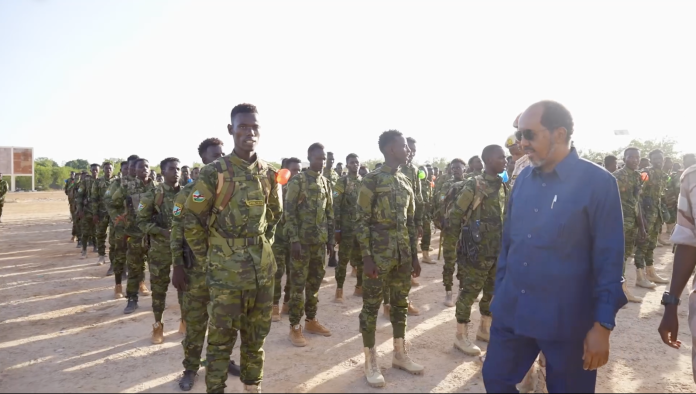MOGADISHU (KAAB TV) – Mustaf Mukhtaar Adan Abdirahmaan’s story is not that of an ordinary terrorist within Al-Shabaab’s ranks. He was a skilled sniper, honing his marksmanship in the dense jungles of Bakool region.
Intelligence sources reveal that his proficiency led to his enlistment as a member of the guards for the group’s former deputy emir, Sheikh Mukhtar Robow Ali (Abu Mansur).
Born in 1997 in Bakool region, Mustaf possessed another asset: intimate knowledge of the region’s intricate alleyways and terrain. This made him a trusted operative for militants, despite facing pressure from both U.S. drone strikes and the opposition by the local community.
Within Al-Shabaab, Mustaf was known by a second name, a typical codename among jihadists: Hassan.
A military position in Mogadishu
When Sheikh Mukhtar Robow defected from the group in 2015, Mustaf followed suit, remaining in Bakool region until an opportunity arose. It wasn’t long before he was offered a military position in Mogadishu.
His former boss, Sheikh Mukhtar Robow, currently serves as the Minister of Religious Affairs for the Somali Federal Government, a role he assumed in early August 2022.
According to Somali intelligence sources, Mustaf joined the UAE-trained Somali security forces in 2022 and was stationed in Mogadishu.
He was not alone; numerous Al-Shabaab defectors with high risk profiles have reportedly integrated into the security forces, facilitated by recommendations from government officials. Mustaf, in particular, was vouched for by a senior official, the identity of whom remains undisclosed.
Tragedy struck on a Saturday afternoon when Mustaf, armed with a machine gun, killed four UAE military officers at the General Gordon military camp in Mogadishu. He was neutralised in a subsequent shooting, officials at the camp said.
The attack prompted Al-Shabaab to claim responsibility, raising questions about Mustaf’s continued affiliation with the terrorist group, despite leaving it eight years prior.
While the Ministry of Defense declined to comment on the incident, and the commander of the Somali Armed Forces (SNA) remained unresponsive to inquiries, scrutiny intensified over the vulnerability of Somali forces to infiltration by sophisticated terrorists.
The victims of the attack included Colonel Mohamed Al Mansouri, the senior UAE military officer overseeing the training program for Somali forces, along with Warrant Officer 1 Mohamed Al Shamsi, Warrant Officer 1 Khalifa Al Balushi, and Corporal Suleiman Al Shehhi.
Their deaths underscored the gravity of the security situation in Somalia and the challenges faced in combating terrorism.
President Hassan Sheikh Mohamud pledged an investigation into the incident. However, public skepticism persists, as previous promises of accountability for terrorist attacks have yielded few tangible results.
As the death toll from such terror attacks continues to rise, the urgent need for effective measures to address extremism remains paramount.


